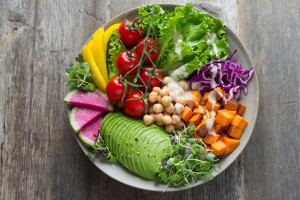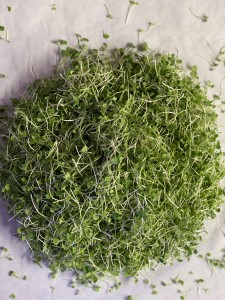“Let food be thy medicine and medicine be thy food.” Hippocrates
While there is no “one size fits all” cure for depression, there are many things that we can work on to help our mental health, one of which, is our diet. More research is coming out every day that shows the benefits and harms that food can have on your physical, mental, and overall well being. Specifically, research has shown that a deficiency in vitamin B, omega-3 fatty acids, vitamin D, and magnesium increases one’s risk for depression. (1) As does a diet that is high in fat and processed foods.

In March of 2016, the first dietary recommendations for the prevention of depression were published. (2) These recommendations included eating a Mediteranian-like diet that is high in omega-3 fatty acids, foods containing phytonutrients, and a decrease in processed and refined foods. Along with these guidelines, it is known that omega-3 fatty acids, B-vitamins, zinc, magnesium, and vitamin D are essential for brain health and resiliency and that a deficiency in these vitamins are often linked to depression, due to the pathophysiology of depression.
Foods rich in B vitamins such as whole grains and dark leafy greens may help protect against depression, since B vitamins help in the creation of neurotransmitters such as serotonin and dopamine. Omega-3 fatty acids, zinc, magnesium, and phytonutrients, (which are abundant in leafy green vegetables), promote the expression of BDNF, (Brain Derived Neurotropic Factor), which is a key player in neuroplasticity, or your brains ability to adapt and heal.
After the study in 2016, the World Journal of Psychiatry took a practical actionable approach to diet and mental health and looked at foods containing the above nutrients that have been linked to lower instances of depression and scored both plant and animal foods based on their concentration of those key nutrients. This way, individuals could start to eat for their depression.
The foods that were the highest in these nutrients were: oysters, muscles, seafood, and organ meats for animal foods, and leafy greens, peppers, and cruciferous vegetables for plant foods. (1)
When it comes to diet and depression, the numbers don’t lie. Not only are certain vitamins essential to the brain health that decreases the instances of depression, but in a randomized clinical trial regarding diet as an intervention to treat depression, it was found that patients prescribed a Mediterranean diet, (a diet rich in vegetables, healthy fats such as olive oil, fish, nuts, seeds, and low in processed foods), as part of their treatment for depression, resulted in 31% of patients achieving full remission from depression, as compared to the control group. (1)
So what does diet and depression mean to you?
Diet plays an integral part in physical and mental health, and focusing on eating healthier will have a positive effect on all wellness aspects of your life. Try limiting the processed foods and foods high in sugar from your diet and increasing your intake of fresh vegetables and healthy fats and see how you feel. Did you know that your recommended daily intake of vegetables is 3 cups a day? And only 9% of Americans are reaching that goal. If you are having trouble reaching that goal, try incorporating nutrient-dense vegetables and superfoods into your diet for the most “bang for your buck” of nutrition, so to say. Leafy greens such as microgreens are an excellent way to do this, which is why our nurse, Melinda, grows them on her farm.
Melinda has seen firsthand the effect of nutrition on both mental illness and autoimmune disease which led her to start a farm with her husband and educate the community about healthy eating and looking at food as medicine. She knows that healthy eating can be a struggle, (she used to eat pizza twice a week), but she also knows that changing your diet can be life changing.
If you want to take a look at your own diet and how you can improve it for your health, call or email us to book a nutritional consult with Melinda. And if you are looking for an easy way to eat healthier, check out her farm here, and sign up for their winter CSA.
Eating healthy is about balance, not about limitations. It’s about incorporating healthy, nutrient-dense foods into your meals every day, and reducing the amount of processed and high sugar foods you consume. It’s about viewing food with a critical eye and seeing it as medicine and sustenance, as well as pleasure. It’s about taking control of your health and well being and doing what you can for your body. It’s also about self-forgiveness and acceptance. It’s about doing your best, and having compassion for yourself when you struggle. It’s about self-love.
- LaChance, L. R., & Ramsey, D. (2018). Antidepressant foods: An evidence-based nutrient profiling system for depression. World journal of psychiatry, 8(3), 97-104. https://doi.org/10.5498/wjp.v8.i3.97
- R.S. Opie, C. Itsiopoulos, N. Parletta, A. Sanchez-Villegas, T.N. Akbaraly, A. Ruusunen & F.N. Jacka (2017) Dietary recommendations for the prevention of depression, Nutritional Neuroscience, 20:3, 161-171, DOI: 10.1179/1476830515Y.0000000043

